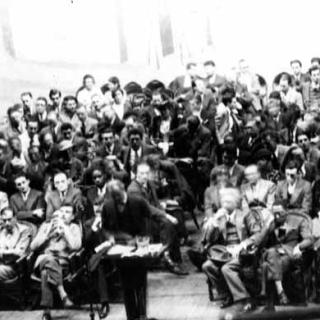Activist Literature
The Proletarian Literary Movement
1929-1941
Ongoing
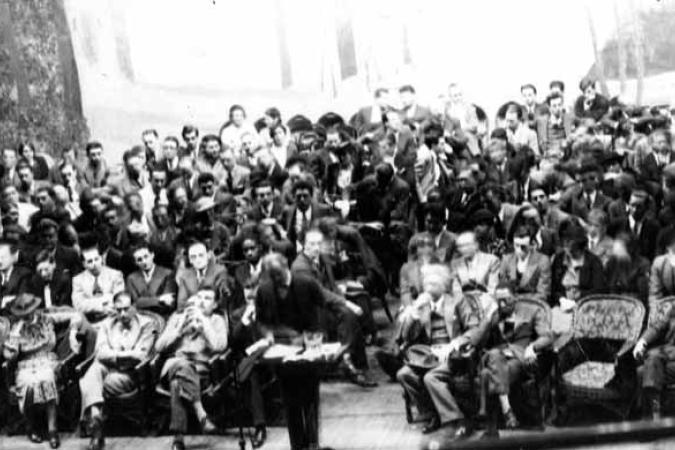
Back to Exhibitions
In the 1930s, in the midst of the Great Depression, many New York writers used novels and poems as tools to address the working class, or “proletariat.” Using the written word to advance their political agenda, these writers espoused their views on class, communism, and global affairs. This movement “does not believe in literature for its own sake,” explained writer and editor Mike Gold, “but in literature that is useful, has a social function.”
As the nation’s publishing capital, New York was the center of the proletarian literary movement. Literary-minded activists formed organizations such as John Reed Clubs and the League of American Writers to spread their message; established magazines such as New Masses; and held debates at clubs and conferences. The proletarian literary movement was part of a broader cultural wing of the “Popular Front,” a broad anti-fascist political alliance initiated by the Communist International, in which artists used literature, music, theater, photography, and film to advocate for a global leftist politics.
World War II, and specifically disillusionment with the foreign and domestic policies of the Soviet Union, altered the course of the movement. The Popular Front alliance shattered in 1939, when the Soviet Union signed a nonaggression pact with Nazi Germany.
Increased internal factionalism and a changing geopolitical landscape led groups such as the League of American Writers to disband in 1943. Proletarian literary voices continued after the war, but the focus of New York’s intellectuals shifted from economics to a critique of culture.
Meet the Activists
Michael Gold

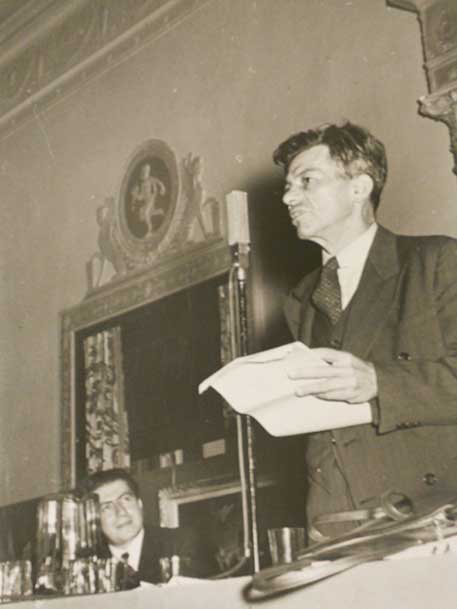
Michael Gold
The writer Mike Gold was at the center of the development of the proletarian literary movement. A founding editor of New Masses, a novelist, a Daily Worker columnist, a literary critic, and a popular speaker and debater, Gold merged literary acheter viagra activity with radical politics. His bestselling, semi-autobiographical novel Jews Without Money (1930) became a model for other proletarian authors.
Image Info: ca. 1935, Courtesy Tim Davenport Collection.
William Gropper


William Gropper
The artist William Gropper was a frequent contributor to New Masses, which he also helped found. Born in the Lower East Side to a working-class family, Gropper’s work often decried capitalism and defended the working class.
Image Info: Alfredo Valente, ca. 1940, Courtesy Alfredo Valente Papers, 1941-1978, Archives of American Art, Smithsonian Institution.
Langston Hughes
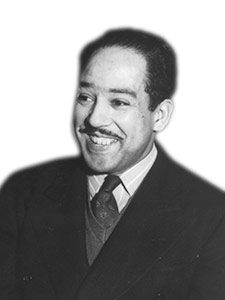
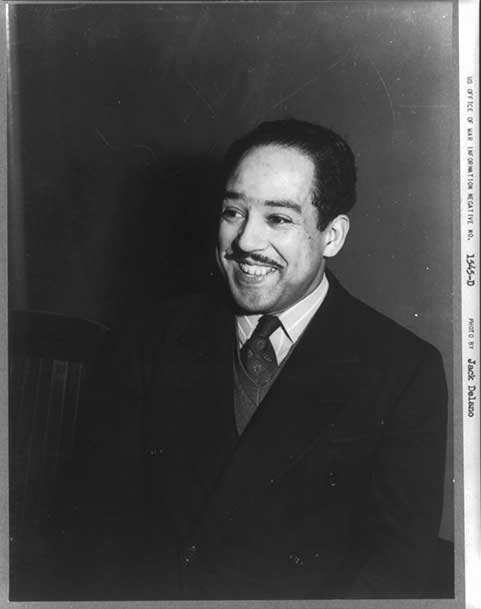
Langston Hughes
Writer and activist Langston Hughes was active in the proletarian literary movement in New York as well as in the Harlem Renaissance. He participated in John Reed Clubs, worked to free the Scottsboro Boys, and became a Communist sympathizer.
Image Info: PJack Delano for OWI, ca. 1942, Courtesy Library of Congress, Prints & Photographs Division, LC-USZ62-43605.
John Reed


John Reed
John Reed came to New York in the early 1910s to work as a journalist, and joined The Masses magazine soon thereafter. He became known for his reports on the Russian Revolution, including his firsthand account Ten Days that Shook the World, and later fled to the Soviet Union. John Reed Clubs, formed in his name in 1929, harnessed literature and art to Marxist ideology. Through 30 chapters nationwide, the clubs founded magazines, sponsored art exhibits, arranged theater productions, and held dances and concerts.
Image Info: Bain News Service, 1910-1915, Courtesy Library of Congress, Prints & Photographs Division, LC-DIG-ggbain-19363.
Objects & Images
Delegates Of The First American Writers’ Congress
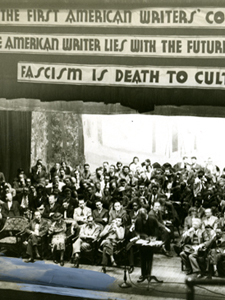
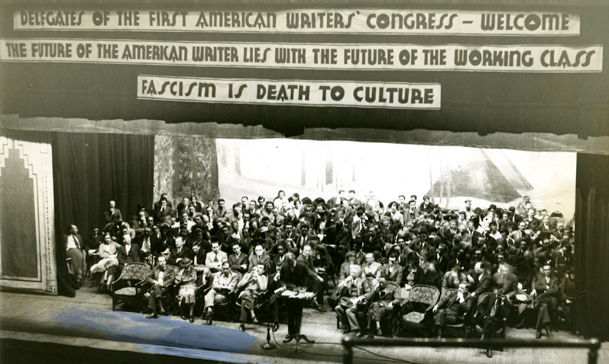
Delegates Of The First American Writers’ Congress
Following a Soviet directive to build political organizations with broader appeal, the American Communist Party formed a “League of American Writers” in 1935 in New York City. The Writers’ Congress mobilized both radical and liberal poets, novelists, dramatists, critics, essayists, and journalists to encourage social change and to fight “fascist tendencies” at home and abroad. Attended by 216 “writer-delegates,” the first Congress occurred at a moment of heated debates within the Left regarding how much to cooperate with liberals.
Image Info: 1935, Courtesy Daily Worker/Daily World Photographs Collection, Tamiment Library & Robert F. Wagner Archives, New York University.
"New Masses"
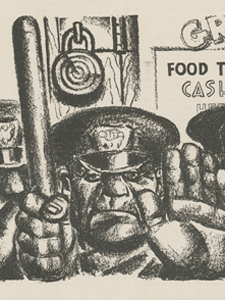
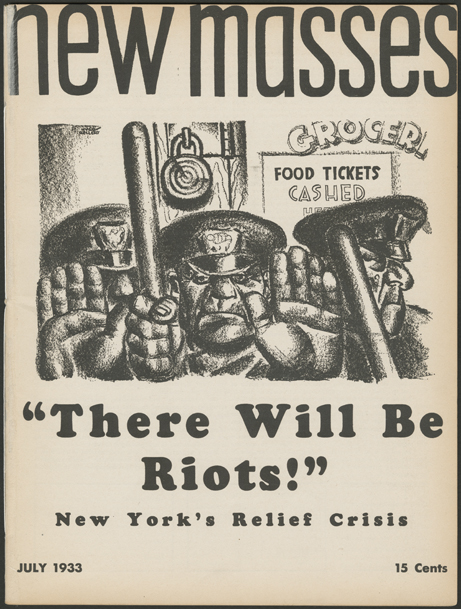
"New Masses"
The New Masses was the leading outlet for proletarian literature. Founded in 1926 with loosely leftist positions, the magazine adopted a more radical stance by 1929 and reached a circulation of 25,000 by 1935. Distinguished by bold headlines and satirical cartoons, New Masses characterized capitalism as a system of wage slavery and portrayed workers as potential revolutionaries.
Image Info: July 1933, Courtesy Tamiment Library & Robert F. Wagner Labor Archives, New York University.
Alex Bittelman, "How Can We Share The Wealth?"
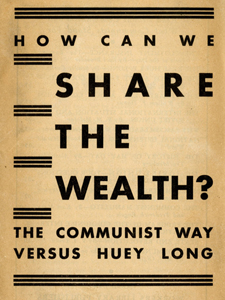
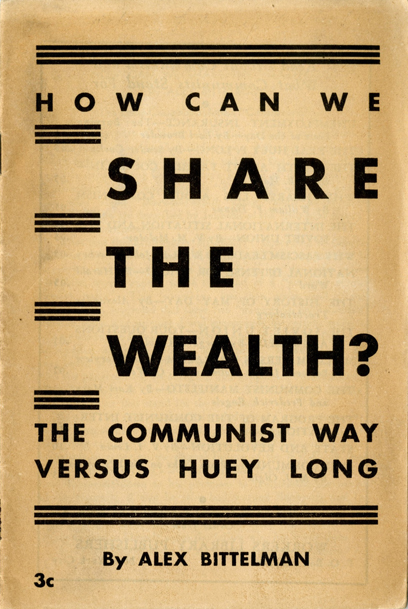
Alex Bittelman, "How Can We Share The Wealth?"
Louisiana Democratic Senator Huey Long gained national attention in 1934 when he unveiled his “Share Our Wealth” plan to redistribute income. Though some critics called him a “communist,” Long described himself as a “populist”—a man of the people. In this pamphlet, the Communist Party distinguishes between Long’s plan, based largely on a progressive tax code, and the communist ideals of a classless society.
Image Info: (New York: Workers Library Publishers, April 1935), Courtesy Private Collection.
Alex Bittelman, "Trotsky The Traitor"
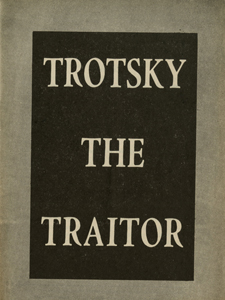
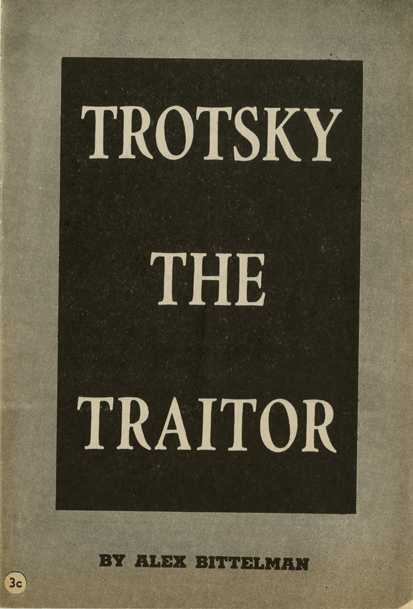
Alex Bittelman, "Trotsky The Traitor"
Disputes among radical American writers mirrored the political turmoil in the USSR. In particular, the Moscow “Show Trials” (1936-38) sharpened the division between the supporters of Joseph Stalin and his exiled rival, Leon Trotsky. This 1937 pamphlet by Alex Bittelman, a founder of the American Communist Party and Stalin partisan, denounces Trotsky as a traitor.
Image Info: (New York: Workers Library Publishers, February 1937), Courtesy Private Collection.
Langston Hughes, "A New Song"
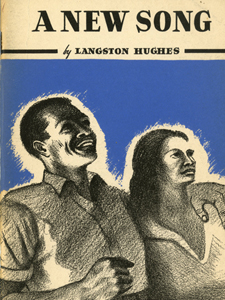
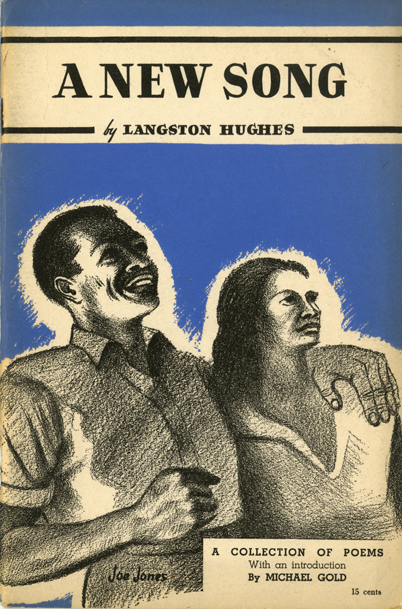
Langston Hughes, "A New Song"
In 1939, Langston Hughes delivered the keynote address at the Third American Writers’ Congress, likening the segregation of African Americans to the persecution of Jews in Nazi Germany. Hughes’s 1939 poem “A New Song” reflects his twin interests in racial harmony and communism, embodying essential qualities of proletarian literature:
Revolt! Arise!
The Black
And White World
Shall be one!
The Worker’s World!
Image Info: (New York: The International Workers Order, 1939), Courtesy Private Collection.
"Partisan Review"
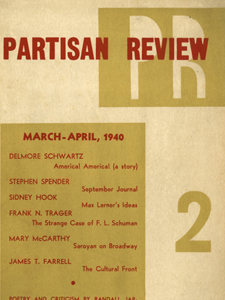
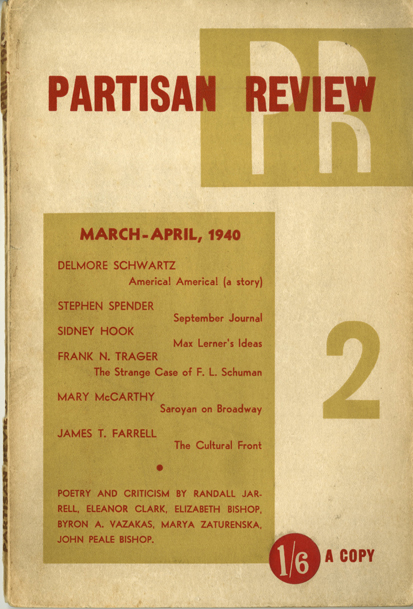
"Partisan Review"
Partisan Review emerged in 1934 from the New York chapter of the John Reed Club as an independent alternative to New Masses, the organ of the American Communist Party. Firmly anti-Stalinist, Partisan Review became a primary outlet for New York intellectuals, including Sidney Hook, Mary McCarthy, and Delmore Schwartz, all contributors to this 1940 issue.
Image Info: March-April 1940, Courtesy Private Collection.
Key Events
| Global | Year | Local |
|---|---|---|
|
The Russian Revolution ushers in the Soviet Union |
1917 | |
| 1919 |
"The Masses" reporter and poet John Reed publishes "Ten Days that Shook the World," his firsthand account of the Bolshevik Revolution, and later flees to the Soviet Union |
|
| 1926 |
"New Masses" founded (published until 1947) |
|
| Stock market crash prompts New York radicals to envision alternatives to capitalism | 1929 |
|
| 1930 |
Michael Gold’s "Jews Without Money" published The "Partisan Review" is founded as a publication of the John Reed Club of New York |
|
| New York writers mobilize to protest the Scottsboro Boys, nine African-American youths falsely accused and convicted of rape in Alabama | 1931 | |
| New Deal begins | 1933 |
|
